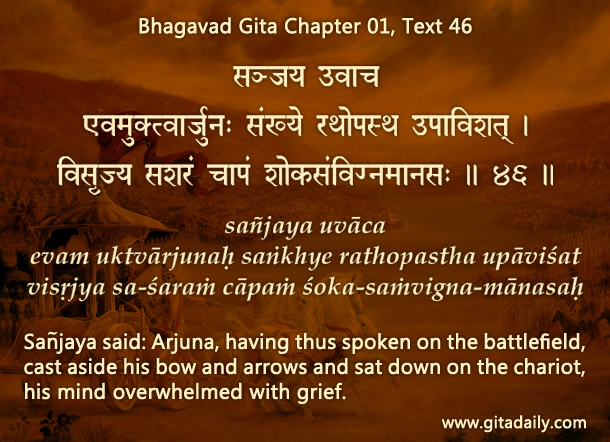The Bhagavad-gita’s first chapter concludes with a confused Arjuna putting aside his bow in confusion and dejection (01.46). While addressing Arjuna’s concerns, the Gita focuses on addressing his situation in universal terms.
Given the Gita’s universality, it is apt to consider Arjuna’s plight in broad terms. Arjuna can be said to represent us all. Like him, we all will, sooner or later, face perplexities that will sap our will to discharge our responsibilities. Just as Arjuna cast aside his bow, we too may cast aside our metaphorical bow: our will to act.
Initially, Arjuna was ready to do his difficult duty (01.15). But he went out of his way to see the opposing army (01.21-26) and then let his mind drive his moral reasoning about the war (01.27-25). Relying on his eyes and mind left him demoralized and paralyzed.
In terms of Vedic epistemology, knowledge derived from our senses, often represented primarily by the eyes, is called pratykasha; and knowledge derived from the workings of our mind is called anumana. While both of these can be useful for daily functioning, they fall painfully short when dealing with life’s ultimate concerns.
To address these concerns, we need to gain knowledge from divine sources that focus on big questions such as the meaning and purpose of life. Vedic epistemology refers to such transcendental knowledge as shabda. Arjuna sought wisdom from the supreme divine source, Krishna (02.07) — and his conviction was restored (18.73). The Gita, being the recorded words of Krishna, provides us similar divine access.
By understanding the Gita, we all can find our way through perplexities and lead a meaningful, purposeful and ultimately successful life.
One-sentence summary:
When faced with perplexities that compel us to ponder life’s big questions, we need to learn from Arjuna’s example — and not rely solely on our senses and mind, but seek insight through Gita wisdom.
Think it over:
- How can we understand Arjuna’s plight in universal terms?
- In terms of Vedic epistemology, what are the three ways of acquiring knowledge?
- How does Arjuna’s narrative reveal the role of these three ways of acquiring knowledge?
***
01.46: Sanjaya said: Arjuna, having thus spoken on the battlefield, cast aside his bow and arrows and sat down on the chariot, his mind overwhelmed with grief.
To know more about this verse, please click on the image


A clear mind mirror God